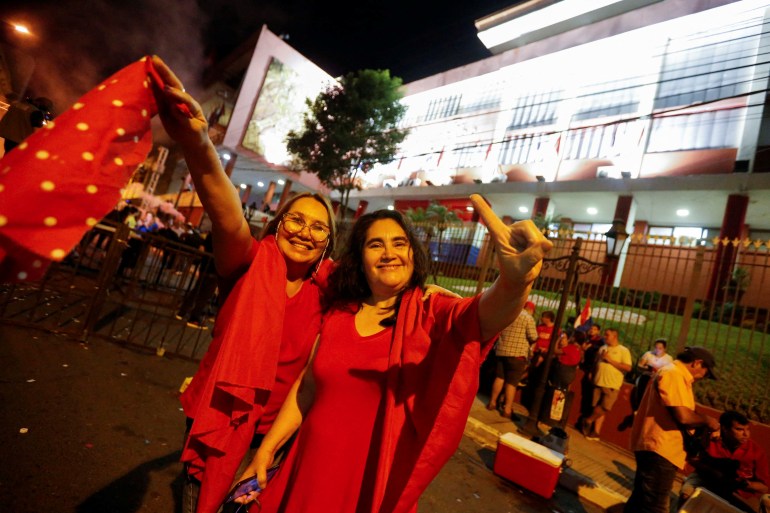Santiago Pena wins Paraguay election after hard-fought campaign
Pena’s conservative Colorado Party was facing a tough challenge from the left over corruption, and poverty.

Santiago Pena has won Paraguay’s election, returning the conservative Colorado Party to government after a tightly-contested campaign that had threatened to end its seven-decade hold on power.
The 44-year-old economist and former finance minister had 42.7 percent of the vote with more than 99 percent of ballots counted, according to the electoral body, a more than 15-point lead over centre-left rival Efrain Alegrem, a 60-year-old lawyer from the Concertacion coalition.
Keep reading
list of 4 itemsTaiwan in the hot seat during Paraguay presidential elections
US accuses top Paraguay politicians of corruption, spurring probe
US offers $5m for information on Paraguayan prosecutor’s killers
Some 4.8 million of the South American country’s 7.5 million people were eligible to vote in the election for the president and legislature.
“Thank you for this Colorado victory, thank you for this Paraguayan victory,” Pena said.
“Today, we are not celebrating a personal triumph, we are celebrating the victory of a people who with their vote chose the path of social peace, dialogue, fraternity and national reconciliation.”
Conceding defeat, Alegre said simply: “The effort was not enough”.
Alegre, a lawyer, had a narrow lead in opinion polls heading into the vote, raising the prospect that he might unseat the Colorado Party that has governed almost continually since 1947 — through a dictatorship and since the return of democracy in 1989.
“We have a lot to do, after the last years of economic stagnation, of fiscal deficit, the task that awaits us is not for a single person or for a party,” Pena said in his victory speech, calling for “unity and consensus”.
Though they differ on economic and international policy, the two frontrunners were both socially conservative, defending strong anti-abortion rights and anti-gay marriage stances in an overwhelmingly Catholic nation.

Paraguay is among only 13 countries to recognise Taipei over Beijing, and Alegre had promised to reconsider the relationship if he won, while Pena said he would maintain ties.
China considers self-ruled, democratic Taiwan part of its territory, has not ruled out the use of force to take control of the island, and has sought to isolate Taiwan on the international stage.
Honduras shifted allegiance to Beijing in March, following Nicaragua in 2021, El Salvador in 2018, Panama in 2017, and Costa Rica in 2007.
The Taiwanese embassy in Paraguay congratulated Pena on his victory, and said Taipei would continue to work together with Paraguay on their “fruitful” relationship.
Alegre had also campaigned on corruption in the Colorado Party, which has seen two of its top members recently hit with sanctions by the United States over alleged corruption.
They include Pena’s political mentor and president of the Colorado Party, former President Horacio Cartes.
Paraguay is ranked 137 out of 180 countries on Transparency International’s Corruption Perceptions Index.
Other election issues included poverty, social inequality and escalating crime.